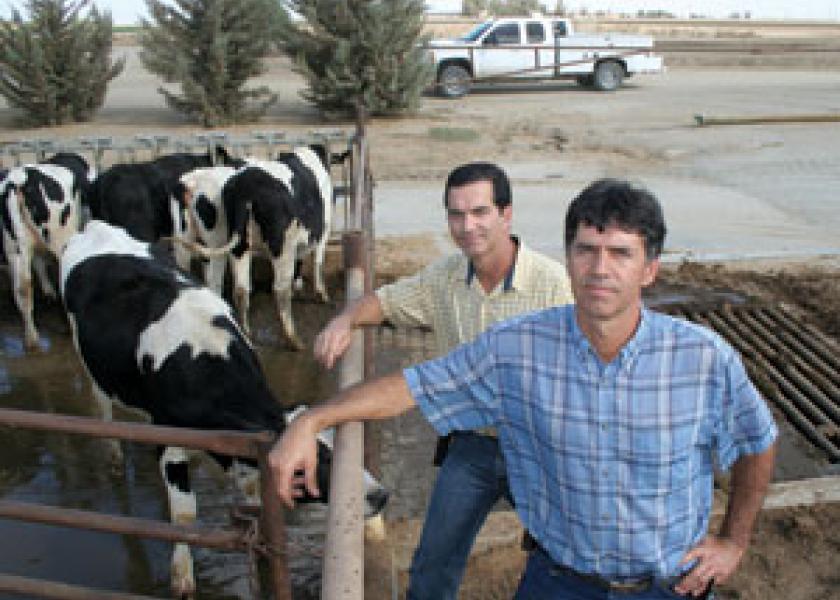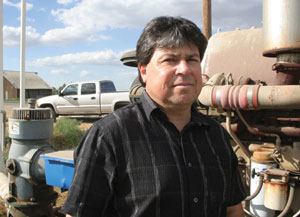Railroaded by a Bullet Train

California’s high-speed rail threatens dairies.
If California’s high-speed rail (HSR) project cuts through Joe Machado’s dairy farm as proposed, the tracks will divide his farmland into an 80-20 split, cutting off his access to his fields, disrupting his underground irrigation and wastewater systems, and costing him $1.872 million in annual gross revenues.
Just two miles north, brothers Mike and Manuel Monteiro will see similar impacts to their 3,450-cow dairy and 1,000-acre farm.
Machado and the Monteiros are among 16 dairies between Fresno and Bakersfield that lie in the path of the bullet train that’s expected to slice through the heart of the state’s Central Valley by 2018. The region is home to the bulk of California’s milk and crop production.
Machado and the Monteiro brothers farm near Hanford, Calif., in Kings County, where milk is the No. 1 farm commodity and where 13 of the 16 affected dairies sit. The Machado and Monteiro dairies, combined with two other neighboring dairies, are home to 19,700 cows in a three-mile radius that will feel the HSR impact. The dairy producers and others are actively fighting the HSR plan.
"The HSR track will be like a Great Wall of China running through my property," says Machado, who milks 900 cows at his third-generation dairy and farms 700 acres of feed crops.
The route planners "have cleverly positioned the track so it doesn’t knock down our buildings or facility, but it will destroy my whole infrastructure," Machado says.
Approved by California voters in 2008, the state’s HSR project plans to connect San Francisco and Los Angeles in two hours and 40 minutes. The electrically powered bullet train will race at speeds of up to 220 mph and cover 800 miles of track, skirting towns and cities but plowing right through farmland. The ground-level track will be fenced off, with no way to cross it except for overpasses.
The HSR project is expected to cost $68.4 billion, up from original projections of $33 billion. Construction will begin in the Central Valley, with the first build-out slated between Fresno and Madera, about 35 miles north of Hanford.
Critics say the HSR project is no longer what voters approved. They say it has deviated from the original goal of routing track along existing transportation corridors. They believe it also has failed to adequately address the concerns of landowners whose property and businesses lie in the bullet train’s path.
"The High-Speed Rail Authority saw green squares on a map," says Diana Peck, program director for the Kings County Farm Bureau. "They didn’t understand at ground level what kind of impacts they’re creating."
Track, setbacks and an overpass will consume 83 acres of Machado’s prime, contiguous farmland. That will reduce the number of cows his permit allows him to milk. The HSR track also will cross four sets of pipeline that carry wastewater to his fields.
 |
| Joe Machado stands beside one of three irrigation wells that would be displaced if the high-speed rail comes through his Hanford, Calif., property. Cost to replace each well is about $450,000. |
Nobody knows whether those underground pipelines can withstand the train’s weight and vibrations. But what Machado does know is this: Because the train will traverse his property and displace part of his infrastructure, he’ll have to purchase and install three new irrigation wells and two lift pumps. He’ll also have to build a new ditch for surface water deliveries across his land.
Transportation also will be affected, including numerous road closures. "There will be no way for me to get across the track to my fields unless I go five miles out of my way," Machado says. That will affect harvesters, other field equipment and milk trucks. "I’ll be paying extra mileage fees forever," he adds.
The Monteiros built their $10 million dairy in 2006, one of the last dairies erected before tough permitting regulations brought new dairy construction to a halt in the Central Valley. In 2010, the Monteiros also constructed a $3.5 million, four-acre solar project on their dairy.
The HSR will bisect 30 acres of the Monteiros’ property. They’re not happy with HSR authorities’ apparent disregard for the bullet train’s impact on their pipelines, transportation routes or ability to spray fields adjacent to the train track.
"The HSR alignment will cut off my maintenance shop and my fueling yard from the rest of my dairy," says Mike Monteiro, who will lose 10 acres to the bullet train project.
The California High-Speed Rail Authority has determined HSR’s effect on confined animal facilities between Fresno and Bakersfield as "Negligible." That’s the third and lowest ranking after "Severe" and "Moderate." The "Negligible" assessment leaves Machado and the Monteiros incredulous. But the worst part, Monteiro adds, is that HSR authorities have yet to contact him or his neighbors about the planned project.
Both Machado and the Monteiros are actively involved with Citizens for California High Speed Rail Accountability (CCHSRA). The grassroots group was formed by Kings County residents to ensure the proposed HSR project does not adversely affect the economy, environment or quality of life in their community or others. CCHSRA is working for these goals through public advocacy, litigation and political action.
"We are not against HSR," Monteiro says. "We are not a NIMBY [not in my backyard] group. We just want the project done correctly, with some regard given to agriculture. Landowners have not been given the respect they deserve. We want the project stopped until they can iron out the issues that Kings County—including farms, other landowners and law enforcement—has. Our requests have been ignored."
So far, CCHSRA has found support from the Kings County Board of Supervisors and Kings County Farm Bureau. The farm bureaus of nearby Madera and Merced Counties are joint plaintiffs in a lawsuit challenging the High-Speed Rail Authority’s environmental review of the Merced-to-Fresno route. The Kings County Farm Bureau, Peck says, is preparing to file a similar lawsuit over concerns about HSR’s impact on farmland along the proposed Fresno-to-Bakersfield route.
"The HSR authorities chose the route through Kings County because they saw it as the path of least resistance," Peck says. "They were wrong."







